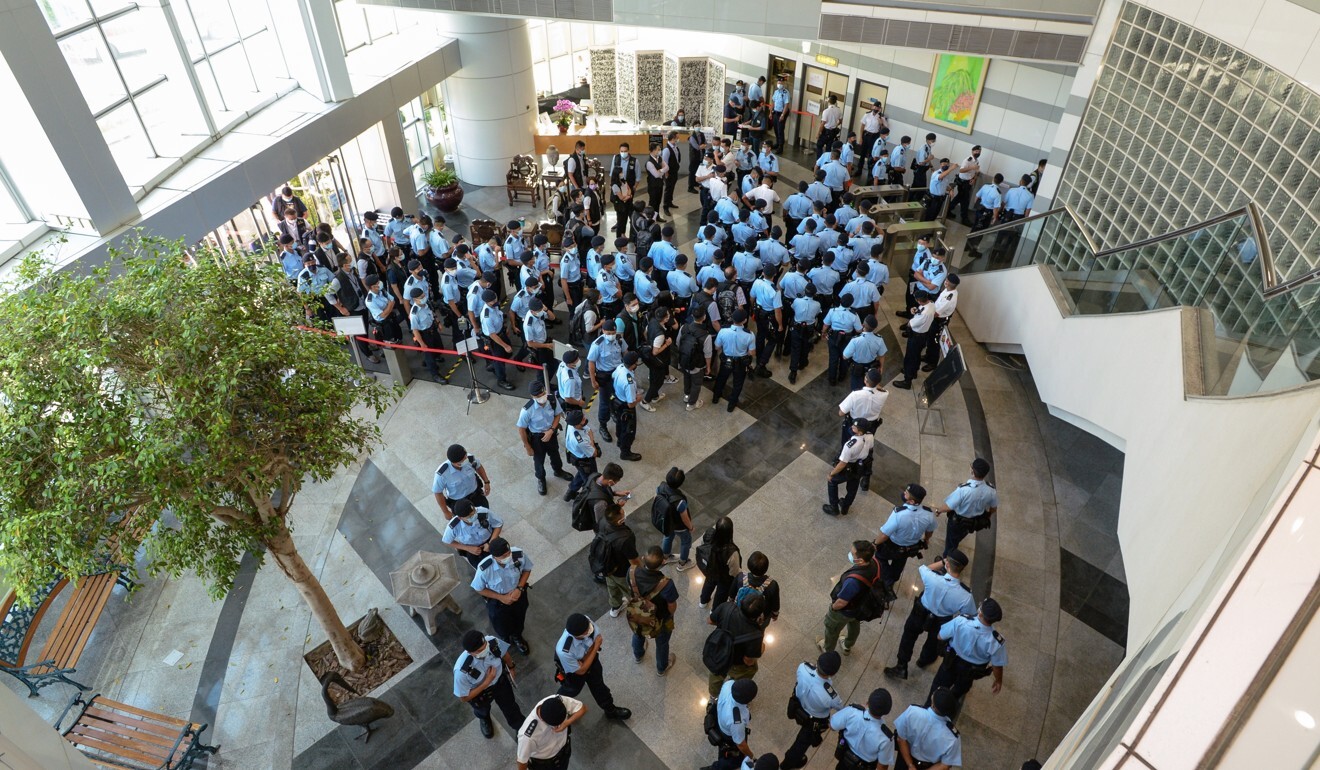
Apple Daily struggling to stay alive as staff quit in wake of national security law arrests
- With just days to go before tabloid’s possible closure, many workers have already left but some vow to stay until final hours
- Hong Kong leader says US condemnation of raid on company’s offices last week is attempt to ‘beautify acts’ that undermine national security
Hong Kong’s Apple Daily has lost almost half its workforce since its top executives were arrested last week, but those remaining have vowed to carry on until Friday when management is expected to announce the tabloid’s final day.
Among the teams that have packed up and gone were those managing online financial news, English-language coverage, breaking news and video content branded as Apple Action News.
Sections still able to maintain basic operations included local news, courts, features, entertainment, sports and photography, while the roughly 20 employees remaining in the print division were committed to keeping the presses rolling until the final edition of the 26-year-old tabloid on Saturday, they said.
Authorities said more than 30 published articles calling for foreign sanctions were evidence of conspiracy to collude with external forces – an offence under the security law, which also targets acts of secession, subversion of state power and terrorism.
The raid sparked an outcry from the international community, with the US State Department accusing authorities of using the security law as a tool to stifle freedom of expression.
Sex, gossip and free fruit: Apple Daily’s launch in 1995
Beijing firmly opposed Washington’s meddling in the internal affairs of the nation and Hong Kong, ministry spokesman Zhao Lijian said, while Lam accused the United States of attempting to justify the tabloid’s actions.
“Don’t try to underplay the significance of breaching the national security law, and don’t try to beautify these acts of endangering national security, which the foreign governments have taken so, so much to their heart,” she said at her weekly press conference.
“Whenever they talk about things that they are doing, they will put it under the banner of safeguarding national security. So what is the basis of applying that sort of double standard to the situation of the People’s Republic of China and the Hong Kong Special Administrative Region?”
Lam argued asset freezing was a globally accepted practice but stopped short of saying whether the bureau would agree to release part of the funds.
“Freezing assets is an international norm, in order to prevent further activities that endanger national security,” she said, without citing examples.
The Labour Department would provide assistance to the tabloid’s workers, whose rights were protected by law, she said.

01:36
Hong Kong leader Carrie Lam says Apple Daily raid was not attack on press freedom
At the end of the press conference, an Apple Daily reporter, who was not given a chance to ask questions during the session, shouted: “You said the national security law only affected a small number of people. But more than 800 people from my company were forced to lose our jobs. Can you respond, Mrs Lam?”
Lam left the auditorium without answering.
A veteran editor at the tabloid, who wished to remain anonymous, said at least 40 per cent of the newsroom had tendered their resignation since last week’s arrests but the remaining colleagues intended to soldier on until the end.
“We are quite confident that we won’t cease operations before Friday despite manpower constraints,” he said. “Some have vowed to work until the last minutes before the paper shuts.”
Some staff members who had resigned were dissatisfied with the board’s decision to extend the deadline to Friday, as they felt the chances of the company’s assets being released were slim, he added.

A reporter, who also spoke on condition of anonymity, said many employees decided to quit after the company announced they would not be required to give one month’s notice.
A journalist who had worked for the tabloid for nearly a decade said some colleagues, including those working on the political team, had been concerned about possible legal action, while others who deemed their jobs “less risky” wanted to stay until the final hours.
“People are doing their best even though we know the paper could shut down at any time, and teams have started to share workloads in order to make the paper publish as usual,” he said.
“The finance team is helping to work on local news, while the breaking news team is helping with interviewing colleagues as they do not have enough manpower to work outside.”
Spotlight on Apple Daily as experts debate alleged Hong Kong security law breach
Next Digital had about 1,300 employees according to its latest annual report, but reports by Apple Daily have put the recent headcount at roughly 800.
The Next Media Trade Union said it had met senior management, who confirmed that Saturday would be the last publication day if the board decided to dissolve the company.
The union also confirmed the director of the tabloid’s digital platform, Cheung Chi-wai, who was among the three granted bail, had resigned.
The union said it understood why management needed time to make a final decision about operations amid such difficult times.
“Some colleagues have already decided to resign over personal and family reasons,” it said. “The union respects their decisions and sends them our most sincere blessing.”



